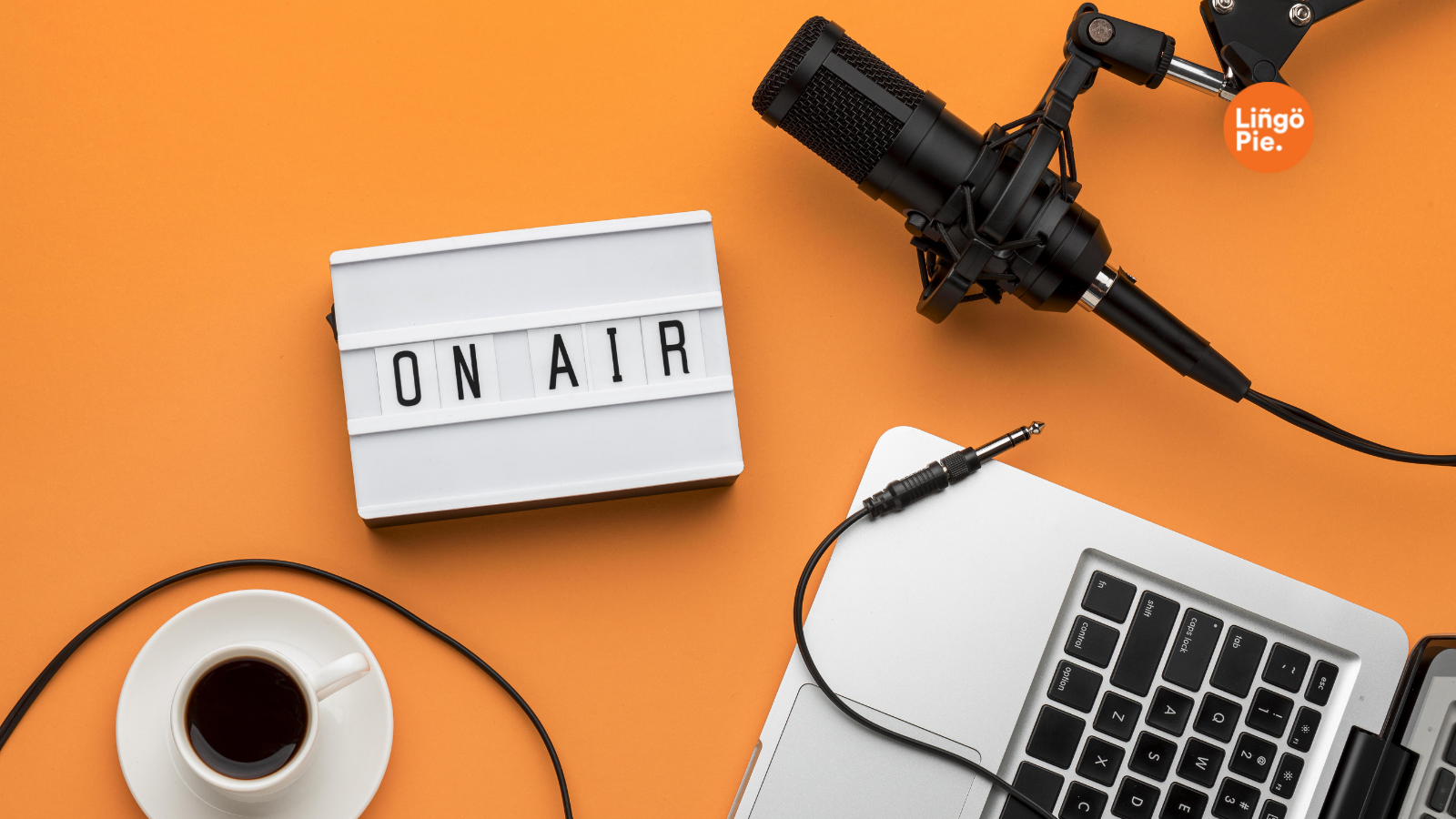Have you ever wondered if you could actually learn a new language without having to use the same unengaging resources you had access to in high school? How about whether listening to foreign songs could actually help you learn a language?
Well, according to science, the answer is yes! Gone are the days of unburying dusty old textbooks to take on language learning. These days, one of the most popular ways is to learn Spanish through music.
Learning language through music has become increasingly widespread in the digital age. Besides being scientifically proven to be effective, it's a fun and creative way to learn. In this blog post, we'll be sharing with you how music can be one of your best pals on this journey.
We at Lingopie created a a new free product called Lingopie Music which enables you to sing your way to fluency with your most favorite songs. Currently we have only songs in Spanish but soon we'll add more. You can check out the best spanish songs to learn Spanish here.
Why singing can help in learning foreign languages
Singing can benefit students when learning a language because there are common features to both music and language that allow music to improve and shape language processing.
As proposed by many scientific studies, music and language are intimately connected at the sensory and intellectual levels and share many of the same resources. Moreover, music improves several cognitive skills, especially those it's closely linked to, i.e. language.
It has also been shown that there is a connection between music and verbal memory, which would explain why you get some songs stuck in your head!
Emotions activate our memory processes and, in turn, music evokes strong emotions, making it a more powerful tool for memorization and offering an explanation for earworms!
Even just playing music in the background will help you progress.

How songs help you learn a language
So, now that we've seen why it works, let's take a look at how your brain actually pulls it off!
Using music to learn a foreign language helps you remember words, phrases, and sentences within a real-life context.
Music brings in culture in a very organic way. Song lyrics give you context clues and idiom knowledge, which means that instead of simply using your memory to acquire vocabulary and grammar that you might not even be able to combine into comprehensible sentences, you're actually able to capture the way in which people express themselves in your target language.

Music is also useful when learning a language because when you sing a song in a foreign language, you will naturally try to reproduce the sounds you hear, which will lead to pronouncing the words correctly.
Prosody helps students in learning a language since it's how your brain actually picks up on tone, phonetics, and rhythm. This makes music a very powerful tool for memory recall because when you listen to songs, the melodies and lyrics are often remembered together.
It has even been found that learning a foreign language through music helps you develop a better understanding of the grammar and structure of the language in a practical way.
Can you learn a language through music?
Yes. One of the best ways to learn a language through music is to find songs in your target language, sung by native speakers and to listen to them over and over again, while also trying to sing along. You'll quickly learn the words to the song and their correct pronunciation.
Another great way to use music for language learning is to find music videos on YouTube. There are many videos that are made specifically for language learners, and they can also be a great way to improve your understanding. Here's a great article on how to learn languages on YouTube.
Steps to learn a new language through music
Language learning does not have to be monotonous. You can pick up linguistic information by listening to songs.
When you're learning a language through music, playing songs in the target language can help you learn grammar, vocabulary, and pronunciation. Additionally, singing along can help you internalize the vocabulary and remember it better.
One way to find songs is to search for them on YouTube. You can also find music from other countries by looking for compilations on Spotify, Amazon, or iTunes.
Here are a few steps to learning a new language with music:
1. Go for the music you like
Choose songs that will be pleasant and engaging to listen to because that'll keep you interested and motivated.
Language learners will often make the mistake of picking songs purely because of their slow rhythm but by following your musical taste, you'll have better chances of remembering the lyrics.
2. Read the lyrics
Find a song in your target language, and try to understand the meaning. Find the English translation or a video with subtitles and you will pick up on new words.
Once you have found a song that you like, take a few minutes to listen to it and learn the words. After finding the translation of the lyrics online, try reciting the words along with the music. After a while, you will start to know the words without needing to listen to the music.
3. Get the translation
Understanding the meaning of song lyrics is important to help you learn a new language through music. In fact, it can be a fun and enjoyable way to learn a new language.
Either by translating the original lyrics of your favorite songs yourself or just looking up the translation, you can not only learn the words but also get an idea of the song's meaning. This can help you better understand culture beyond words.
So, next time you're feeling adventurous as you learn a new language, give translating song lyrics a try!
4. Break the songs down into “chunks”
When you are learning a new language, breaking the songs down into “chunks” can be really helpful. This means that you listen to the song once or twice in full and then divide it into different parts.
Once you've done that, listen to each "chunk" separately then try to recite the words along with the music. After a few repetitions, you'll have memorized the words in no time!
5. Write down the phrases and words you could use daily
You will learn vocabulary just by hearing songs in your target language but you can also benefit from writing these down in order to help your brain assimilate them. This is a great strategy not only to learn vocabulary but also to apprehend grammar in an organic way.
Moreover, it can help you incorporate them so that you can then practice them in a real-life context.
6. Sing along (to practice your pronunciation)
Don't worry about being off-key! A student's speaking will benefit hugely if they sing along to a song. When you sing along you try to mimic the sounds that you hear, which will make your accent less obvious.

You'll therefore be opening up to a great way to practice your new language skills... You will be mastering your pronunciation! If you're wondering, yes - there are accent reduction techniques and training.
Learn languages on Spotify
Spotify features that will help you when learning a language through music:
- Spotify lyrics: Spotify provides lyrics for most of its songs. You can not only check pronunciation and see how a given sentence is written but also learn natural, connected speech.
- Spotify playlists: with viral top hits per country, search through other people’s language learning playlists and make your own. You can use those for your next lesson and cultural/musical discovery.
- Spotify offers many podcasts: you can listen to free lessons in your target language, or just listen to a podcast on any topic you find interesting in the language you want to learn.
Songs from around the world: the best songs for beginners
Improve your linguistic skills by taking a musical trip around the world. Learn about new artists and expand your knowledge of the culture of your target language.
If, for example, you're learning any of the languages below, check out the songs we recommend and you might even come across your new favorite song!
Learn Spanish with music
It'll all depend on your musical taste, but some good songs that'll help you learn are "La Bicicleta" by Carlos Vives, "Vivir Mi Vida" by Marc Anthony, and "Bailando" by Enrique Iglesias.
You can learn also learn Spanish with audiobooks from beginner to advanced. Want to know the best part? You can find audiobooks to learn Spanish as well as TV shows and movies on Lingopie!
Learn French with music for beginners
Learn how to speak like native speakers! For example, if you're looking to learn French, some songs that may help you assimilate the language are "La Vie En Rose" by Edith Piaf, "À Coup de Rêves" by Ben L'Oncle Soul, and "Je Veux" by ZAZ.
If you're still not sold on the idea of learning French, maybe these 13 French movies for beginners will change your mind!
Learn Italian with music
Try learning Italian with "Cose Della Vita" by Eros Ramazzotti, "Un Raggio Di Sole" by Lorenzo Jovanotti, the iconic "Con Te Partiró" by Andrea Boccelli.
By the way, have you thought of mixing language and cooking? Why not try learning Italian with the best Italian cooking shows!? We still don't have the scientific facts to back up the statement eating improves your language skills, but we know for a fact learning Italian with TV is a lot of fun!
German songs for beginners
For example, "Komm Gib Mir Deine Hand" a German version of the famous Beatles song, “99 Luftballoons” by Nena and "Guten Morgen, Sonnenschein" by Nana Mouskouri are all great to start learning German.
If you want to learn German, try watching the Top 20 German Movies and TV Shows.
Learn Russian with music
If your goal is to learn Russian, try "Higher" by popular singer-songwriter Nyusha, the folk song "Kalinka" by Ivan Larionov, or "What Is Autumn" by rock band DDT.
If taking a look at the Cyrillic alphabet is enough to discourage you from learning Russian, don't lose hope yet - we've got an article for you: How to Start Learning Russian by Yourself in 10 Simple Steps.
Learn Portuguese through music
If in turn, Portuguese is what you're going for, how about checking out Salvador Sobral's "Amar Pelos Dois", which was a huge success in the Eurovision contest, or even "A Vida Toda" by Carolina Deslandes and "Já Sei Namorar" by Tribalistas.
If you want to have the confidence to sing and learn Portuguese - and without drinking too much Caipirinha, pick up these Portuguese phrases for travel and you'll be ready for a night of karaoke!

Conclusion: Learning a New Language through Music
If your goal is to learn a new language, then consider learning through music.
Whether you listen to the same song a dozen times and learn the lyrics by heart or you just play it in the background while doing something else, it doesn't matter, your brain will be picking up on the rhythm of the language and optimizing your learning.
Of course, it has been shown that using a variety of tools rather than relying solely on one method is a good way to ensure success, but choosing a musical approach may truly be the key to unlocking your linguistic potential.
Sign up for a free trial with Lingopie and take on the world of languages through music!






![7 Best Spanish Music Festivals Worth Participating In [2025]](/blog/content/images/size/w300/2025/05/spanish-music-festivals.jpg)


